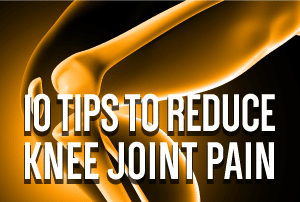
Knee pain can be debilitating for those that suffer, it often seems like there is no end to the constant pain that comes from knee joint pain. Although most never find a complete reprieve from the pain, there are some simple steps that anyone can take to improve their comfort and reduce daily knee joint pain.
If you would like to walk more comfortably each day, consider these tips:
- Don’t Rest Too Much
Too much rest can weaken muscles, which can worsen knee joint pain. Finding an exercise program that is safe and works with your joint pain is tough, but stay with it. If you're unsure which exercises are safe, talk with your clinician or a physiotherapist.
- Maintain A Healthy Weight
One of the leading causes of knee joint pain is obesity. Maintaining a healthy weight reduces the load on the knees and also helps to ensure that you adopt a healthy posture. Although losing weight can be difficult, working together with your doctor to find a healthy balanced diet, can be in many cases the best way to reduce knee pain in the long-term and enable you to work toward improving your overall health.
- Ask Your Doctor About Insoles
Flat feet, or feet with high arches can affect your walking gait ( the way you walk) this has an impact on knee joint pain. In many cases, investing in a pair of orthopaedic insoles can be a great choice as it can help restore a natural walking gait, provide you with a more comfortable walking posture. It is important that you consult a clinician prior to buying a pair of insoles, buying the wrong insoles can exacerbate the symptoms.
- Exercise
Even for those whose knee joint pain inhibits their mobility, it is important that you find a way to exercise the knee. Cardio exercises strengthen the muscles that support the knee and increase flexibility overall. Weight training and stretching can be a great way to reduce knee joint pain in the long-term.
When choosing an exercise choose one that falls within your pain threshold, it is crucial it is aligned to your fitness level.
- Low-Impact Exercises
When suffering from knee pain even moderate exercise can ease the pain. Unfortunately, many traditional exercises such as running will potentially cause more damage and result in more pain due to the force in which the foot strikes the floor. It is important that you are able to identify low-impact exercises that suit your lifestyle and condition, such as swimming. When the impact from arthritis threatens to immobilise you gentle exercise will keep you moving.
- Jarring/Locking Your Knees
Avoid exercises that involves running, jumping and all high impact exercises. Opt for low impact strengthening exercises. If you experience pain whilst playing your favourite sport, providing your knee with support from a hinged knee stabiliser can help to relieve the symptoms, alternatively give your knee time to rest and recover.
- Get Enough Sleep
Sleep is critical to aid with recovery; this is when your body does most of its healing. A healthy sleep schedule can help to limit the effects of painful knees over time and is vital to your overall recovery. For many, knee pain, however pain can impact on the ability to sleep. In this case you may want to consult with your doctor about available options.
- Use P.R.I.C.E.
PRICE stands for protection, rest, ice, compression and elevation which is the first steps in knee pain management.
Protect the area from further injury, rest is essential, if you are bearing weight on your knee throughout the day, you must find time to rest. Wearing a support can also protect the joint from further injury.
Ice is important for reducing swelling and pain, when icing your knee, elevate your knee, wrap the knee with a bandage to compress and prevent further swelling.
- Over The Counter Medications
The most common ways to manage severe knee pain is to use over the counter medications to control the pain. For knee pain, doctors generally prescribe anti-inflammatory medications, these medications can help to reduce swelling and relieve pain, making it easier to get through the day. It is important that you speak with a clinician about appropriate dosage amounts.
- Ice and/or Heat
For many individuals living with knee pain, ice can help relieve pain and swelling and heat can help ease stiffness. Ask your doctor about how to safely use an ice pack and/or heating pad. A hot shower in the morning or warm bath at night can also alleviate pain in the knee.

